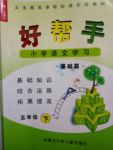题目内容
________ for school once in a while often makes Mr. Smith angry.
A. Tom being late B. Tom to be late C. For Tom being late D. Tom's being late

 小学学习好帮手系列答案
小学学习好帮手系列答案 小学同步三练核心密卷系列答案
小学同步三练核心密卷系列答案I began to grow up that winter night when my parents and I were returning from my aunt's house, and my mother said that we might soon be leaving for America. We were on the bus then . I was crying, and some people on the bus were turning around to look at me. I remember that I could not bear the thought of never hearing again the radio program for school children to which I listened every morning.
I do not remember myself crying for this reason again. In fact, I think I cried very little when I was saying goodbye to my friends and relatives. When we were leaving I thought about all the places I was going to see-the strange and magical places I had known only from books and pictures. The country I was leaving never to come back was hardly in my head then.
The four years that followed taught me the importance of optimism, but the idea did not come to me at once. For the first two years in New York I was really lost-having to study in three schools as a result of family moves. I did not quite know what I was or what I should be. Mother remarried, and things became even more complex for me. Some time passed before my stepfather and I got used to each other. I was often sad, and saw no end to "the hard times".
My responsibilities in the family increased a lot since I knew English better than everyone else at home. I wrote letters, filled out forms, translated at interviews with Immigration officers, took my grandparents to the doctor and translated there, and even discussed telephone bills with company representatives.
From my experiences I have learned one important rule: almost all common troubles eventually go away! Something good is certain to happen in the end when you do not give up , and just wait a little! I believe that my life will turn out all right, even though it will not be that easy.
【小题1】What can we learn about the author from paragraph 4?
| A.She worked as a translator. |
| B.She attended a lot of job interviews. |
| C.She paid telephone bills for her family. |
| D.She helped her family with her English. |
| A.her future will be free from troubles |
| B.it is difficult to learn to become patient |
| C.there are more good things than bad things |
| D.good things will happen if one keeps trying |
A, how I turn to be optimistic B. I am leaving for America
C. my life in America D. the importance of optimism
根据短文内容,从下框的A-F选项中选出能概括每一段主题的最佳选项。选项中有一项为多余项。
| A.The secret of the writer’s success |
| B.A writer with enduring popularity |
| C.Well-received creation to encourage Brits |
| D.The insight into human nature |
F. The story appreciate for school students
1. ____________
Charles Dickens is often thought of as one of England’s great writers. Yet for many his language is old-fashioned and his story plots often improbable. Why, Dickens, out of so many other great English writers, has made the list? How then to explain Dickens’s enduring popularity?
2. _____________
One reason undoubtly is the British government’s insistence that every child studies a Dickens novel at school. Alongside Willian Shakespeare, Charles Dickens is a compulsory (必读的)writer on every English literature school reading list. His stories, though often over-long by today’s standard, are superbly written moral tales. They are filled with colorful characters.
3. ______________
But what makes his books stand out from other English writers is his insight into human nature. Dickens, like Shakespeare, tells us truths about human behavior that are as true to citizens of the 21st century as they were to his readers in the 19th century. Readers have returned to Dickens’s books again and again over the years to see what he has to say about readers’ own time.
4. _______________
The BBC adapted one of his less well-known novels, Little Dorrit, into a popular television drama that introduced many Brits to the novel for the first time. A dark story about greed and money, it was the perfect story to illustrate the bad times. No surprise then that it was Dickens Britons turned to, during the economic crisis last year, to make sense of world rapidly falling apart.
5. _______________
Readers of the 19th and early 20th century usually prized Dickens’s earlier novels for their humor and pathos(悲痛). While recognizing the virtues of these books, critics today tend to rank more highly the later works because of their formal coherence and acute perception(洞察力) of the human condition. For as long as Dickens’s novels have something to say to modern audiences, it seems likely that he will remain one of Britain’s best loved writers.